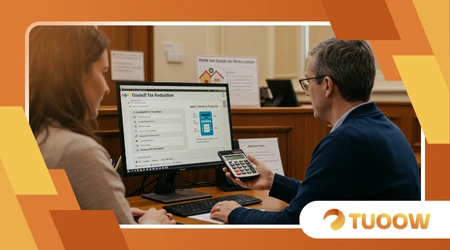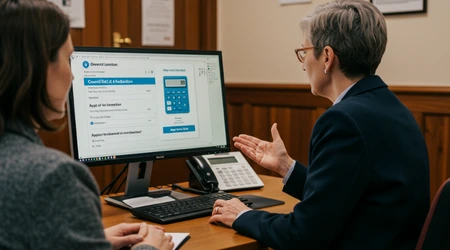Council Tax Reduction: How to Apply and Save Money

Council tax reduction schemes are lifelines for UK households struggling with rising bills.
In 2025, with council tax hikes averaging 4.99% in England and up to 15.6% in parts of Scotland, these reductions can save you hundreds annually.
This guide unpacks how to apply, who qualifies, and smart strategies to maximize savings.
Think of council tax reduction as a financial safety net tailored to catch those stretched thin by soaring living costs.
We’ll explore eligibility, application steps, and insider tips, all grounded in real-world examples and current data. Ready to ease the burden? Let’s dive in.
Rising costs make April a brutal month for budgets. Energy, water, and council tax bills spike, squeezing households already grappling with inflation.
Council tax reduction isn’t just for the unemployed it’s for anyone on a low income, receiving benefits, or facing unique circumstances.
This blog post aims to empower you with clear, actionable advice. We’ll avoid jargon, focus on practical steps, and highlight pitfalls. By the end, you’ll know exactly how to claim what’s yours and save money.
Why does this matter now? The Resolution Foundation notes that poorer households are hit hardest by 2025’s tax rises, with 90% of English councils levying the maximum increase.
Council tax reduction can offset this, but only if you act. Whether you’re a single parent, a carer, or just scraping by, this guide is your roadmap to financial relief.
Let’s break it down with real stories, hard facts, and a touch of optimism because saving money feels good.
Understanding Council Tax Reduction
Council tax reduction replaces the old Council Tax Benefit, offering discounts of up to 100% based on income, benefits, or household status.
It’s not a one-size-fits-all deal each local authority sets its own rules. In 2025, eligibility often hinges on receiving benefits like Universal Credit or having a low income.
Single occupants, students, and disabled individuals may also qualify for specific exemptions.
The beauty of council tax reduction lies in its flexibility. For example, a single parent in Birmingham on Universal Credit might see their bill slashed by 80%.
But here’s the catch: you must apply through your local council. Policies vary wildly Caerphilly’s average bill is £419 below Wales’ average, while Monmouthshire’s is £590 higher. Check your council’s website for tailored criteria.
Don’t assume you’re ineligible. Middle-earners struggling with higher tax bands can sometimes qualify, especially if facing temporary hardship. The key?
Proving your financial situation. In Scotland, a council tax reduction can also cut water and waste charges by up to 35%, doubling your savings. Start by understanding your council’s thresholds and deadlines.
Curious about the bigger picture?
++ Government Grants in the UK: How to Apply for Free Money
Local councils face a £44.1 billion budget in England for 2025-26, driving tax hikes. Council tax reduction schemes ease this pressure for vulnerable residents.
If you’re on benefits or a low income, you’re likely eligible don’t let bureaucracy stop you. Research your council’s application process to unlock these savings.

Who Qualifies for Council Tax Reduction?
Eligibility for council tax reduction isn’t limited to the unemployed or destitute.
If you’re on benefits like Pension Credit, Jobseeker’s Allowance, or Universal Credit, you’re a strong candidate.
Low-income workers, carers, and disabled individuals often qualify too. Even students and single occupants can claim discounts.
Consider Jane, a part-time carer in Sheffield. Earning £15,000 annually, she applied for council tax reduction and saved £600 yearly.
Also read: How to Apply for Council Housing in the UK
Her council assessed her income, household size, and caring responsibilities.
Janea single occupant discount, cutting her bill by 25%. Jane’s story shows how varied eligibility can be don’t assume you’re out of luck.
In 2025, councils prioritize low-income households, but specific groups shine. Disabled residents may get a “Disabled Band Reduction” if their home is adapted.
Full-time students and those with severe mental impairments can claim exemptions. Always check your council’s website criteria differ across England, Scotland, and Wales.
A 2023 study by the Institute for Fiscal Studies found 1.9 million eligible households miss out on council tax reduction annually. Why?
Many don’t know they qualify or fear stigma. If your income barely covers bills, apply. From single parents to pensioners, reductions are designed to help.
Don’t let pride or confusion cost you hundreds.
Read more: ow to Appeal a Benefits Rejection in the UK
How to Apply for Council Tax Reduction
Applying for council tax reduction is straightforward but requires diligence. Start at your council’s website most offer online forms.
You’ll need proof of income, benefits, and household details. Submit promptly, as some councils backdate reductions only to the application date.
Take Mark, a chef in Swansea. Facing a 6.2% tax hike in 2025, he gathered payslips, Universal Credit statements, and ID.
His online application took 20 minutes, and he secured a 50% reduction. Mark’s tip? Double-check documents to avoid delays. Missing paperwork can stall your claim.
Processing times vary some councils take weeks, others months. Follow up if you don’t hear back within 21 days. If denied, appeal with extra evidence, like recent bills or medical records.
Persistence pays off many successful claims come after a second try.
For the tech-averse, visit your council’s office or call their helpline. In Dumfries and Galloway, for instance, you can email [email protected] or call 030 33 33 3005.
Be proactive delays can mean missed savings. Apply early in 2025 to cover the full financial year.
Maximizing Your Savings
Getting a council tax reduction is step one maximizing it is next. First, explore additional discounts. Live alone? Claim a 25% single-person discount. Disabled?
Check for band reductions. These stack with reductions, boosting savings.
Review your council tax band. If your property’s band seems high, challenge it via the Valuation Office Agency.
A lower band means a lower bill before reductions. In 2025, band D bills in Wales average £2,170 every reduction counts. Reassessments are free but require evidence, like neighbor comparisons.
Consider payment plans. Spreading payments over 12 months (instead of 10) eases cash flow, especially with a reduction. Contact your council to adjust terms.
In Scotland, reductions can cut water bills too ask about this hidden perk.
Stay proactive. Reductions aren’t always automatic, even if you’re on benefits. Reapply annually or when circumstances change, like job loss or a new housemate.
Regular checks ensure you’re not overpaying. Treat council tax reduction like a yearly financial health check.
Common Pitfalls to Avoid
Navigating council tax reduction isn’t always smooth. A common mistake? Assuming eligibility without checking. Rules vary by council don’t guess.
Always verify your status on their website or by phone to avoid wasted effort.
Another trap is incomplete applications. Missing payslips or outdated benefit details can lead to rejection. Double-check every document before submitting. If you’re unsure, call your council’s helpline better safe than sorry.
Failing to report changes is risky. New income or housemates can alter your reduction.
Notify your council within 21 days to avoid overpayments or penalties. Honesty keeps your savings secure.
Lastly, don’t ignore denials. If rejected, appeal with fresh evidence. Many councils reverse decisions after clarification.
Persistence can turn a “no” into hundreds in savings. Stay organized and don’t give up.
Table: Average Council Tax Increases by Region (2025-26)
| Region | Average Increase | Average Band D Bill |
|---|---|---|
| England | 4.99% | £2,171 |
| Scotland | 8-15.6% | £2,010 |
| Wales | 7.2% | £2,170 |
Why Acting Now Matters
In 2025, council tax bills are climbing 4.99% in most of England, 8%+ in Scotland, and up to 9.5% in Wales. Why wait to ease the sting?
Applying for council tax reduction now can save you hundreds before April’s bills hit. Delaying risks missing backdated relief.
The process is simpler than you think. Like tuning a guitar, it takes a little effort to get the notes right but the result is harmony in your budget.
With councils under financial strain, reductions are a vital lifeline. Don’t let inertia cost you.
What’s stopping you? Fear of rejection or paperwork?
Most applications succeed, and help is available. Visit your council’s website, grab your documents, and act. In 2025, every pound saved counts make council tax reduction your financial win.
Conclusion
Council tax reduction is more than a discount it’s a tool to reclaim control over your finances. In 2025, with bills rising across the UK, these schemes offer real relief.
From single parents to pensioners, millions qualify, yet many miss out. Don’t be one of them. Check your eligibility, gather documents, and apply today.
The savings potentially £100s or £1,000s can transform your budget.
This guide has armed you with steps, tips, and real stories, like Jane and Mark’s, to navigate the process. Avoid pitfalls, maximize discounts, and act fast.
Your council’s website is your starting point don’t wait for bills to pile up. In a year of financial squeezes, council tax reduction is your chance to fight back. Ready to save? The choice is yours.
Still unsure? Reach out to your council or explore resources like MoneySavingExpert for extra guidance. Every step you take brings you closer to savings.
Make 2025 the year you master your council tax and keep more money in your pocket.
Frequently Asked Questions
Who can apply for council tax reduction?
Anyone on a low income, benefits, or in specific groups (e.g., students, carers, disabled) may qualify. Check your council’s criteria.
How much can I save with council tax reduction?
Savings vary up to 100% off your bill. For example, a low-income household might save £500-£2,000 annually.
What documents do I need to apply?
You’ll need proof of income (payslips), benefits (award letters), ID, and household details. Check your council’s requirements.
Can I appeal if my application is rejected?
Yes, provide extra evidence (e.g., bills, medical records) and request a review. Many appeals succeed.
Do I need to reapply every year?
Some councils require annual reapplications, especially if circumstances change. Confirm with your council to stay covered.
